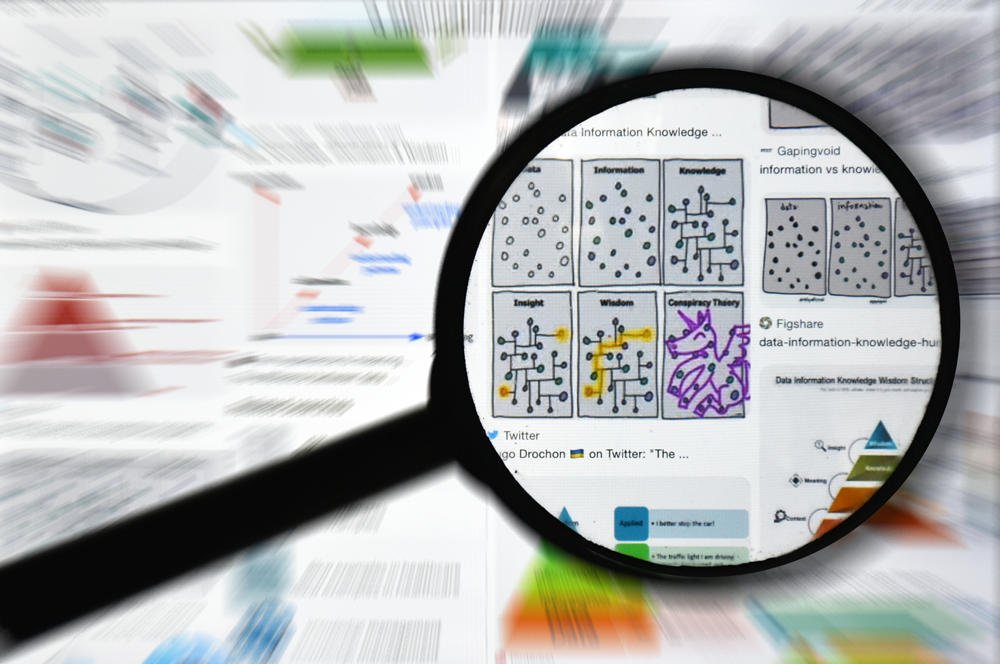I sometimes catch myself thinking of information useful and, when I do, I tell myself that it’s because it provides knowledge that enriches. But what I forget that information is no more than a collection of data or facts with no guarantee of validity. It isn’t information itself that is powerful.
Let me demonstrate: Here is some information: 0961392142
Did you immediately try to suss out some meaning from this number?
You could argue that the phone book is useful for the information it contains. But that being the case, the information would still have to have a context. If I need somebody’s phone number and the above number happens to be the number I am looking for, that number will definitely be useful because it has a context.
Knowledge comes from knowing the context of the information. Perhaps that is why Google renamed its “Search” division to “Knowledge” division. Or perhaps as Cringely suggests in Google decides knowledge is power, they’re feeling the heat from Microsoft’s Bing.
Gather together facts on a relevant subject, annotate them with the results of studies and you have knowledge because you have context. Now it would be interesting to explore whether Google search results are knowledge or information, but I’ll leave that to you.
So, what if I told you that the above number is the ISBN of a book? Ah, another context! But which context, if any, is the correct one?
And, while knowledge may be power, knowledge is not wise. No amount of erudition can turn knowledge into wisdom.
The recipe for wisdom a bucket of knowledge with a double-dollop of experience, sprinkled with insight.
Food for thought.
If you now know without any doubt the correct context of the above number then you are at least a little bit wiser.


"Information is Useless!"
I think it’s possible that you’re confusing data with information. They are not the same thing. Information is data that has been given context. It’s correct to state that the information in the phone book is useless without context, but I suggest that without that context, it would no longer be information. It would be raw data. Information comprises knowledge or facts about something. That ‘about’ supplies the requisite context.
"It isn’t information itself that is powerful." – If you change the word ‘information’ to ‘data’, I totally agree with you. Good article.
—
Trane Francks — Tokyo, Japan
Author of the forthcoming book Living Intentionally: A Holistic Approach to Health and Happiness
We intuit that Information somehow "informs" in ways that data does not. Or, as you say, that "information is data that has been given a context". I found no evidence to back this up.
According to the New Oxford American Dictionary, under Knowledge, sub-heading THE RIGHT WORD
and under Data, sub-heading USAGE
So where do we get this notion of information being fundamentally different from data? At first I thought it was because we mistakenly lump data (singular) with data (the plural of datum). On further thought, I don’t feel there is a strong enough argument that information or data (s.) or data (pl.) are fundamentally different from each other.
I chose the title of my post precisely because the contrast between data and knowledge has become proverbial to the point of being unquestioned. Hopefully I raised a few more eyebrows than yours. 😉 I stand by the assertion that information does not "inform" any more than data does. While information may contain some kind of context, it is not required by definition, nor is there any guarantee that such context is correct.
"Or, as you say, that "information is data that has been given a context". I found no evidence to back this up."
If you look at the etymology of the word inform, you find that it goes back to Middle English meaning to give form or shape to something. That cannot be done without context. An informant does not dribble out random factoids about just anything; the information passed on to law enforcement by an informant is always about a particular context. Context is the foundation of understanding.
Facts are data used to affirm information as evidence, which by definition is contextual. And if we’re going to offer some definitions, here are some more:
A message received and understood
Knowledge acquired through study or experience or instruction
A collection of facts from which conclusions may be drawn
(Source: WolframAlfpha)
It might be seductive to consider that the dictionary doesn’t support the implicit expectation of context with the word information, but I cannot think of a use of the word that does not have context associated with it.
So, I guess we’ll agree to disagree. 🙂
—
Trane Francks — Tokyo, Japan
Author of the forthcoming book Living Intentionally: A Holistic Approach to Health and Happiness
This reminds me a lot of this video from YT user "Thunderf00t" who in this link discusses the concept of metadata, and without it, regular information without indexing is useless.
http://www.youtube.com/watch?v=RAimv4eiwxs